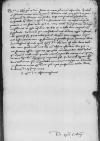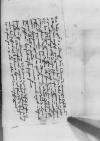Letter #4777
Tiedemann GIESE to Ioannes DANTISCUSLöbau (Lubawa), 1539-06-11
| received [1539]-06-13 Manuscript sources:
Auxiliary sources:
| ||||||||
Text & apparatus & commentaryPlain textText & commentaryText & apparatus
Reverendissimo in Christo Patri et Domino, domino
Reverendissime in Christo Pater et Domine, frater et maior plurimum observande. Salutem et studiorum meorum commendationem.
Placent mihi, quae Reverendissima Dominatio Vestra per hunc puerum de conventu nostro cf.
Iucundisimum est mihi, quod Reverendissimae Dominationi Vestrae tam est cordi bona valetudo mea, quod omnes eius litterae non obscure ostendunt. Pro quo in me fraterno affectu ingentes ago gratias, committens Deo illorum dolorem, qui cf. Vulg. Ps (G) 40, 6-7 Inimici mei dixerunt mala mihi: Quando morietur, et peribit nomen ejus? Et si ingrediebatur, ut videret, vana loquebatur; cor eius congregavit iniquitatem sibi. ⌊dixerunt mala mihi, quando morietur et peribit nomen eius? Quorum cor vana loquebatur, congregavit iniquitatem sibi.cf. Vulg. Ps (G) 40, 6-7 Inimici mei dixerunt mala mihi: Quando morietur, et peribit nomen ejus? Et si ingrediebatur, ut videret, vana loquebatur; cor eius congregavit iniquitatem sibi. ⌋ cf. Vulg. Ps (G) 40, 12 In hoc cognovi quoniam voluisti me, quoniam non gaudebit inimicus meus super me. ⌊In hoc autem cognovi quod Deus voluit me, quoniam non gaudebit inimicus meus super me.cf. Vulg. Ps (G) 40, 12 In hoc cognovi quoniam voluisti me, quoniam non gaudebit inimicus meus super me. ⌋.
Commendo me fraterno amori Reverendissimae Dominationis Vestrae, quam cupio prosperrime valere.
Dat(ae) or Dat(um)⌈Dat(ae)Dat(ae) or Dat(um)⌉
Eiusdem Reverendissimae Dominationis Vestrae observandissimus
Postscript:
Non dubito Reverendissimam Dominationem Vestram audivisse dominum
Fortasse non esset inconveniens, ut dominus



 AAWO, AB., D. 2, f. 115v
AAWO, AB., D. 2, f. 115v